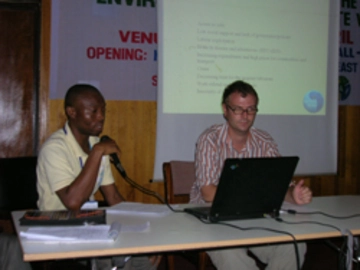Irrigation options in the changing environment of the White Volta Basin - Stakeholder involvement in the GLOWA Volta Project
April 29, 2008.
The GLOWA Volta Project (GVP) organized a multi-stakeholder workshop on ‘Irrigation Options in the Changing Environment of the White Volta Basin’ in Bolgatanga, the regional capital of the Upper East Region of Ghana, from April 1-2 2008. It was organized in collaboration with the United Nations University (INRA) in Accra, the Water Resources Commission and the Ministry of Food and Agriculture.
Main aim of the workshop was to discuss and share scientific knowledge about environmental change and adaptive measures in the West African Volta Basin. The GVP research team in the White Volta Basin is part of the GVP and develops sustainable, efficient and socially acceptable ways of irrigation, contributing to adaptation to environmental change.
After the Honourable Alhassan Samari, Regional Minister of the Upper East Region, opened the workshop, adaptive measures created by the GVP and its Ghanaian partners were presented to the around 80 participants. Among the audience were farmers, development practitioners and local scientists
Studies on Irrigation
The workshop agenda covered a multi-disciplinary range of topics such as regional impact of global climate change, predictions of the onset of the rainy season, patterns of soil degradation, as well as the economic and social drivers and consequences of agricultural water use. In addition, studies on various forms of irrigation expansion thorough shallow ground water irrigation or medium- and small-scale reservoirs as well as different irrigation techniques and alternative forms of water use were presented. A common focus was the enhancing capacity of the different irrigation types and techniques to enable small-scale farmers to adapt to environmental change.
A lively discussion between audience and participants evolved around the research outcome of the GVP in the White Volta Basin so far, in particular options leading to poverty alleviation for the people in the Basin. Topics of particular common interest were tomato marketing, migration, drip irrigation as well as trans-boundary water management. Numerous questions arising from the presentations on soil erosion and degradation, the prediction of the onset of the rainy season as well as other changing environmental conditions proofed the relevance of the research carried out by the GLOWA Volta Project and its partners so far.
Regional impacts of climate change
People in the semi-arid and arid Savannah regions of the Volta Basin are exposed to a rapidly changing environment. The growing population, suffering from poverty and a lack of economic alternatives to agriculture as well as from the negative effects of economic globalization, put an increasing pressure on scarce natural resources such as water, land, pasture and forests. This resource depletion results in the degradation of the natural resource base and decreasing crop yields.
Rain-fed agriculture, the basis of the subsistence of most rural households, also becomes less productive and reliable by climate change. Rising temperatures, declining precipitation, a shift of the onset as well as a shortening of the rainy season, combined with an increasing occurrence of droughts and floods, lead to a higher risk of crop failure and vulnerability of local farming communities.
Recent droughts and floods destroying thousands of farms, leaving the farmers dependent on food aid, showed the gravity of the situation. To adapt to a changing environment and the decline of rain-fed agriculture, governments, NGOs and farmers are rapidly expanding irrigation – with unforeseeable ecological, social and economical consequences.
The GVP, together with Ghanaian partner organisations, focusses on research activities tackling these issues
Publication
The main outcome of the workshop will be published in a book as reference material for the region. In addition, the knowledge shared and generated during the two days’ workshop will be included in a Decision Support System called “White Volta Water Allocation system” (WV-WAS), which is currently being developed by GVP scientists in collaboration with the White Volta Basin Office of the Water Resources Commission. in the White Volta Basin in Ghana.



